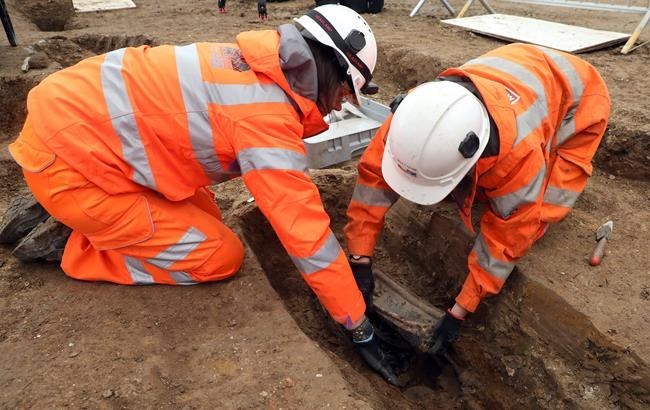
An image taken on Jan. 18, 2019 and issued by HS2 shows archeologists removing the lead plate placed on top of the coffin of Captain Matthew Flinders at the archaeological excavation and research works at St James's Gardens in Euston, London. The remains of Captain Flinders, a noted Royal Navy explorer, who led the first circumnavigation of Australia have been found by archeologists excavating a burial ground where a railway station is planned. The archeologists identified the remains of Flinders by the lead plate placed on top of his coffin. (James O. Jenkins/HS2 via AP)
Republished January 25, 2019 - 4:04 AM
Original Publication Date January 25, 2019 - 1:56 AM
LONDON - The remains of a noted Royal Navy explorer who led the first known circumnavigation of Australia have been found by archaeologists excavating a burial ground where a railway station is planned.
The archaeologists identified the remains of Captain Matthew Flinders by the lead plate placed on top of his coffin. He was buried at St. James's burial ground in 1814 but the headstone was removed in the 1840s, leaving the precise location of his grave a mystery.
Flinders made a number of important journeys and was commander of HMS Investigator when he navigated the entire coast of Australia, confirming it was a continent.
A number of places in Australia have been named after him, including Flinders Station in Melbourne and the town of Flinders in Victoria. A statue honouring him was unveiled in London by Prince William on the bicentenary of his death in 2014.
Officials believe other notables are in the burial ground, including Bill Richmond, a slave born in New York who as a free Londoner gained prominence as a boxer, and James Christie, a naval officer who in 1766 founded the auction house that bears his name.
Experts plan to remove tens of thousands of skeletons from the burial ground, where a rail station for a new high-speed rail line will be built.
HS2, which is building the rail line from London to Birmingham, said the remains of Flinders and roughly 40,000 others will be re-buried at a location to be announced.
Helen Wass, heritage director at HS2, hailed the discovery.
"Given the number of human remains at St. James's, we weren't confident that we were going to find him," she said Friday. "We were very lucky that Captain Flinders had a breastplate made of lead, meaning it would not have corroded."
She said his skeleton will now be studied, in part to gauge what impact a life at sea had on him.
News from © The Associated Press, 2019